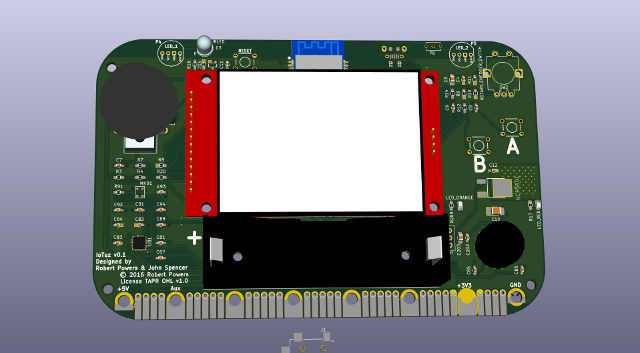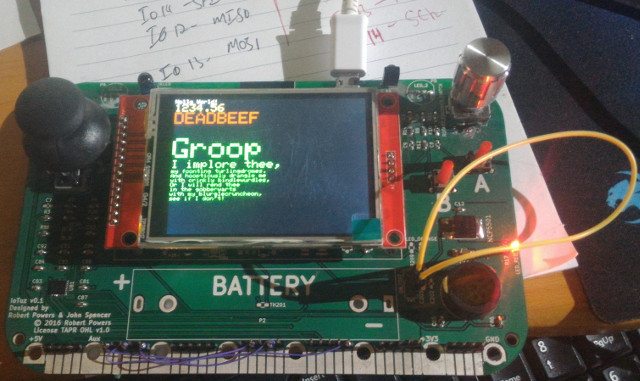OHC2017
Quick information links used at OHMC2017:
- Event videos: Youtube / Video Files
- Assembly: http://tinyurl.com/iotuz-assembly
- Software: http://tinyurl.com/iotuz-software
- Hardware: http://tinyurl.com/iotuz-hw
- Firmware: http://tinyurl.com/iotuz-fw
- These links point to resources listed below, so if they break, don't fret.
The Open Hardware Miniconf 2017 took place as part of LCA 2017 in Hobart, Tasmania, Australia.
The concept of Free / Open Source Software, already well understood by LCA attendees, is complemented by a rapidly growing community focused around Open Hardware and "maker culture". One of the drivers of the popularity of the Open Hardware community is easy access to cheap devices such as Arduino, which is a microcontroller development board originally intended for classroom use but now a popular building block in all sorts of weird and wonderful hobbyist and professional projects.
Interest in Open Hardware is high among FOSS enthusiasts but there is also a barrier to entry with the perceived difficulty and dangers of dealing with hot soldering irons, unknown components and unfamiliar naming schemes. The miniconf will use an Open Hardware assembly project as a stepping stone to help ease software developers into dealing with Open Hardware. Topics will cover both software and hardware issues, starting with simpler sessions suitable for Open Hardware beginners and progressing through to more advanced topics.
The day ran in two distinct halves. The first part of the day was a hands-on assembly session where participants will have the chance to assemble a special hardware project developed for the miniconf. Instructors will be on hand to assist with soldering and the other mysteries of hardware assembly. The second part of the day was a presentations about Open Hardware topics, including information on software to run on the hardware project built earlier in the day. Due to the nature of the hardware project, we will be spending more time on presentations about the IoTuz hardware, software and getting the most out of it.
Venue
The venue for OHMC2017 was Welliington room #2 at Wrestpoint.
Schedule
Date: Tuesday 17th January 2017
Project assembly in the morning followed by talks in the afternoon:
- 10:40 - 10:50 Welcome & Introduction
- 10:50 - 12:20 IoTuz Assembly Workshop (registration required to participate, spectators also welcome)
- 12:20 - 1:20 Lunch
- 1:20 - 1:50 Angus Gratton: ESP32 microcontroller hardware and software
- 1:55 - 2:25 Bob Powers: IoTuz hardware design, manufacturing, working with KiCad
- 2:30 - 300 Mark Wolfe: IoTuz software design challenges and ESP-IDF (Iot Development Framework)
- 3:00 - 3:40 Afternoon Tea
- 3:40 - 4:20 Nick Moore: microPython for ESP32
- 4:20 - 4:40 Andy Gelme: ESP32 development example using IoTuz
- 4:40 - 5:10 Lightning Talks (5 minutes)
- Tim Ansell: I'm Tomu - A hobbyist device which fits inside your USB port
- Kristine Howard: Granny was a hacker
- Marc Merlin: How to row scan an 8x8 LED matrix
- Jill Rowling: Alpaca fibre quality control
- Julien Goodwin: USB-C features and a USB-PD project
- Spare slot
- 5:10 - 5:20 Wrap Up
Lightning Talks
Call for lightning talks now closed.
Call For Papers
Call For Papers is now closed.
Accepted Papers
See schedule above
Discussion Group
There is a Google Group email list for discussion of topics related to the miniconf, including the assembly session:
https://groups.google.com/forum/#!forum/open-hardware-conf
Assembly Project
Each year we help attendees build a project specially developed for the Open Hardware Miniconf.
The project for 2017 was IoTuz -The Internet of Tux
The board is based around the ESP32, which is the big brother successor to the ESP8266 used in the ESPlant project in 2016. Hack-A-Day article describing the ESP32.
Actual cost of the kit, just for LCA2017, is AU$100.
Through hole parts on the board will be assembled on the day, with all the SMD parts being pre-loaded on the board. Assembly instructions
Repository for the project is on Github:
- Hardware: https://github.com/CCHS-Melbourne/iotuz-esp32-hardware
- Firmware: https://github.com/CCHS-Melbourne/iotuz-esp32-firmware
The hardware kit includes ...
- ESP-WROOM-32 module
- 320 x 240 colour touchscreen
- Joystick, rotary encoder (knob), buttons
- 2x APA106 RGB LEDs (10 mm)
- 3 axis accelerometer
- Barometric pressure sensor
- InfraRed transmitter / receiver
- Audio circuit and speaker
- LiPo battery and charge circuit
- Easy access to IO pins .. alligator clip friendly
Project (im)maturity
Regardless of your current level of experience and skill ... you will have an excellent day and walk away with working hardware and software. If you want to get in at the ground floor of the ESP32 developer community, then this is a great place to start. There will be some uncharted territory, some trail blazing and plenty of learning from our mistakes :)
The hardware was initially tested by a short run of 4 prototype PCBs. Problems found were corrected for the production run. All the basics should work ... however, there is a chance that some modest hacking might be required, e.g cutting a track and adding wires.
The ESP32 is very new and modules have only been available in very small quantities to select groups of people for a couple of months. EspressIf have been working (transparently via GitHub) on the RTOS, networking stack and peripheral drivers ... and the basics work, but there is much more work to do.
Software
We've bundled together all the details for developing software on Github at:
Note: These instructions were changed just before the Open Hardware Miniconf 2017, so you will need to update any previous install you have made.
Image 1. Rendered version of the board.
Image 2. Working prototype (missing battery holder).

